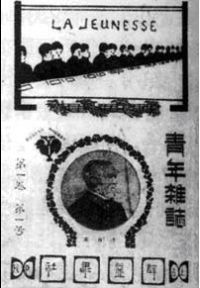Difference between revisions of "Xinqingnian"
imported>Ciic (Created page with 'thumb|200px|right|The first issue of ''The Youth'' magazine The first issue of ''The Youth'' magazine was published on September 15, 1915 in Shanghai...') |
imported>Ciic m |
||
| (5 intermediate revisions by the same user not shown) | |||
| Line 1: | Line 1: | ||
| − | [[File: | + | [[File:xqn.jpg|thumb|200px|right|The first issue of '''''The Youth''''' magazine]] |
| − | The first issue of ''The Youth'' magazine was published on September 15, [[1915]] in Shanghai by its founder and editor, [[Chen Duxiu]]. In 1916 the magazine's name was changed to [[New Youth]](''Xinqingnian'' in Chinese). | + | The first issue of ''The Youth'' magazine was published on [[CIIC:Selected anniversaries/September 15, 2009|September 15]], [[1915]] in Shanghai by its founder and editor, [[Chen Duxiu]]. In 1916 the magazine's name was changed to [[New Youth]] ('''''Xinqingnian''''' in Chinese). |
| − | + | ||
After the failure of the 1913 [[Second Revolution]] launched against the autocrat [[Yuan Shikai]], Chen Duxiu abandoned the idea of political revolution in favor of propaganda. He felt "the most effective way to save China and build the republic is to carry out an ideological revolution." Eventually, he persuaded ''Shanghai Qunyi Publishing House'' to help him publish a new magazine. | After the failure of the 1913 [[Second Revolution]] launched against the autocrat [[Yuan Shikai]], Chen Duxiu abandoned the idea of political revolution in favor of propaganda. He felt "the most effective way to save China and build the republic is to carry out an ideological revolution." Eventually, he persuaded ''Shanghai Qunyi Publishing House'' to help him publish a new magazine. | ||
| − | + | ||
Chen's foreword to the first issue, "[[Advice for the Youth]]", defined the creed of the magazine. He claimed three ideas were fundamental to modern civilization: human rights, biological evolution and socialism, and called on the new generation of youth to renew their thinking and embrace these ideas. Chen encouraged youth to uphold free will, progress, science and opening-up to the world. He attributed Europe's success to its commitment to human rights and science, and said that only democracy and science could save China. "The Youth" magazine was the flagship of China's [[new culture movement]] and Chen's article became the manifesto of the movement. | Chen's foreword to the first issue, "[[Advice for the Youth]]", defined the creed of the magazine. He claimed three ideas were fundamental to modern civilization: human rights, biological evolution and socialism, and called on the new generation of youth to renew their thinking and embrace these ideas. Chen encouraged youth to uphold free will, progress, science and opening-up to the world. He attributed Europe's success to its commitment to human rights and science, and said that only democracy and science could save China. "The Youth" magazine was the flagship of China's [[new culture movement]] and Chen's article became the manifesto of the movement. | ||
[[Category:magazines]][[Category:Culture]][[Category:History]] | [[Category:magazines]][[Category:Culture]][[Category:History]] | ||
Latest revision as of 07:34, 18 September 2009
The first issue of The Youth magazine was published on September 15, 1915 in Shanghai by its founder and editor, Chen Duxiu. In 1916 the magazine's name was changed to New Youth (Xinqingnian in Chinese).
After the failure of the 1913 Second Revolution launched against the autocrat Yuan Shikai, Chen Duxiu abandoned the idea of political revolution in favor of propaganda. He felt "the most effective way to save China and build the republic is to carry out an ideological revolution." Eventually, he persuaded Shanghai Qunyi Publishing House to help him publish a new magazine.
Chen's foreword to the first issue, "Advice for the Youth", defined the creed of the magazine. He claimed three ideas were fundamental to modern civilization: human rights, biological evolution and socialism, and called on the new generation of youth to renew their thinking and embrace these ideas. Chen encouraged youth to uphold free will, progress, science and opening-up to the world. He attributed Europe's success to its commitment to human rights and science, and said that only democracy and science could save China. "The Youth" magazine was the flagship of China's new culture movement and Chen's article became the manifesto of the movement.
